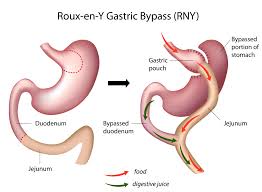-
 Compassionate Healing
Compassionate Healing -
 Compassionate Healing
Compassionate Healing
Roux en Y Gastric Bypass
Laparoscopic Gastric Bypass (LGB) or Laparoscopic Roux-en-Y Gastric Bypass is a complex and non-reversible procedure that helps severely obese patients to lose lot of excess weight. The American societies for Bariatric Surgery and the National Institute of Health have rated Roux-en-Y Gastric Bypass as the current gold standard procedure for weight loss surgery. In this procedure, a small stomach pouch (15 to 20 cc size) is created by stapling a section of the stomach so that the food directly enters into the lower portion of the jejunum, bypassing the beginning of the small intestine, hence reducing calories absorption. The remainder part of the stomach is stapled, not removed, and separated from the stomach pouch.
This results in reduced appetite and satisfaction of hunger with smaller portion of diet. It is estimated that in post Laparoscopic Roux en y gastric bypass, one can lose 60-80% of excess weight in about 2 years time.
Roux en y gastric bypass is recommended in the following cases:
- In grossly overweight persons suffering from co-indispositions like long standing type 2 diabetes or metabolic syndrome.
- Those persons who desire to lose more than 50% of their excess weight and then maintaining it.
- Those who are not only obese but are also suffering from hiatus hernia, severe sleep apnea, Pickwickan Syndrome, Acid reflux, arthritis, severe diabetes mellitus and high Blood Pressure.
Post-Operative Changes / Post Roux en y gastric bypass Care
The ‘dumping syndrome’ symptoms include:
- Overall weakness
- Excessive sweating
- Diarrhea
- Cramps
- Heaviness in stomach or general discomfort
- Vomiting / Retching
- Palpitations
- Nausea
The best way to treat dumping syndrome is to keep track of intolerant foods and avoid taking them. Quite often once the person starts having a recommended diet, this syndrome often improves on its own without any specific treatment or after adjusting your diet.
Benefits of Laparoscopic Roux en y gastric bypass
- Laparoscopy involves inserting a tube with a tiny video camera, called a laparoscope into the abdominal wall through small cuts and the surgeon views the procedure on a separate video monitor which gives better visualization and access to key anatomical structures. As this procedure replaces the need for one long incision to open the abdomen it is considered to be minimal invasive. Patients undergoing laparoscopic weight loss surgery experience less pain post surgery resulting in fast and better recovery. Hence the total hospital stay averages to 2- 3 days only.
- It is the most reliable operation for morbid obesity and long-term weight loss averages 60 to 75 percent of excess body weight as it works by both restriction and malabsorbtion.
- Other benefits with roux en y gastric bypass laparoscopy surgery are fewer wound complications such as infection or hernia, and patients returning more quickly to normal lifestyle.
- Marked improvement in many serious health related problems due to morbid obesity such as:
Hypertension,
Type 2 diabetes mellitus,
Heartburn from gastro-esophageal reflux disease,
Sleep apnea,
Pickwickan Syndrome
High triglycersides
Lipid (cholesterol) abnormalities,
Venous stasis,
Urinary stress incontinence
Post-Operative Weight Gain
Few patients regain some amount of lost weight after 2 to 3 years of surgery as they are not very careful. Close, long-term follow-up is recommended for patients to assess weight loss and counseling to eat small, frequent meals of high protein and low carbohydrate content as a healthy lifestyle and a good exercise routine goes a long way in maintaining weight loss.
Recommended Diet after Roux en y Gastric By Pass
Post-surgery, patients have to follow a nutrition and activity plan which includes a liquid diet for a period of time followed by a progression to soft or pureed foods, and eventually more regular food. Patient can have most kinds of food although in limited quantities within 2 to 3 months of surgery although sweet and calorie-rich foods are to be kept minimum to avoid ‘dumping syndrome’. At least 64oz of fluids per day is also recommended to prevent dehydration, constipation, and kidney stones apart from daily Multi-vitamins, Calcium, Iron supplements.


